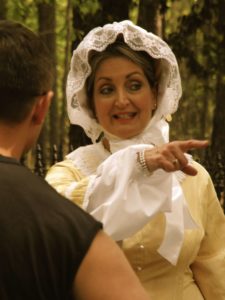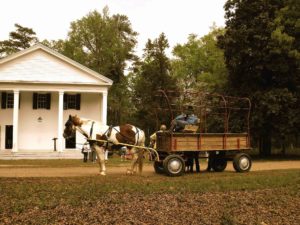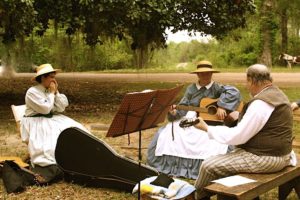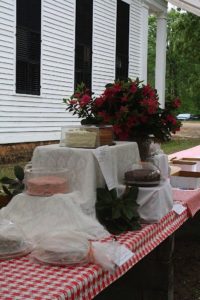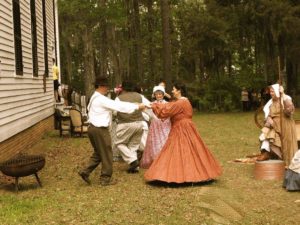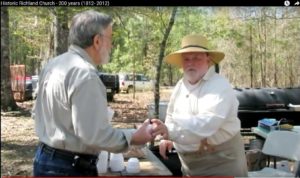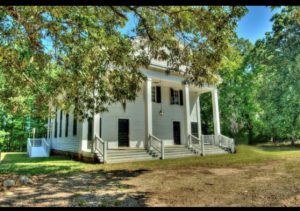211th Homecoming Message

Daniel Williams
Mercer University Libraries & Archives
In Good Company
Ephesians 2:19-22; Hebrews 12:1-2
“Many are her sons and grand sons who have gone out to bless the world. The record of eternity alone will disclose the results of her spiritual ministrations during the years.” This is what pastor and historian Walter M. Lee wrote in 1920 after visiting an abandoned church sanctuary—the one that has been lovingly restored and in which we now sit. Lee drove out here to see a building with doors locked and boarded up, with one column of its edifice destroyed by fire. He gazed through the keyhole to see dust on the floors and pews, although he did note that the plaster was intact. Only eternity will reveal the full fruit borne for Christ’s Kingdom through the years in this place. Those of us here today can take a guess in advance, though, because this place has influenced us. Thanks to the hard work of the Richland Restoration League, we don’t have to settle for looking through a keyhole. We can come in, admire the beauty of this building, enjoy the fellowship, sing praises to our Lord, remember those who have gone before us, hear something that I hope will resemble a decent message, and then partake in that most Baptist of rituals: lunch. Now that I’ve made your tummies growl, please join me in reading two passages of scripture, Ephesians 2:19-22 and Hebrews 12:1-2, as we consider what it means to be in good company.
What God does in our salvation is make us part of a community, a family, Christ’s Body, the Church; you could say He puts us in good company with His Son and with each other. That’s not an insignificant accomplishment; it’s a world-changing one. If you’re reading through the book of Ephesians, you’ll have already discovered what the natural state of humanity is: dead to God in trespasses and sin, and, as a result of that deadness to God, we are also at war with one another. Our God, however, is rich in mercy. He did not treat us as our rebellion against Him deserved. Through the death, burial, and resurrection of His Son, our Lord Jesus Christ, He has made us alive again; he offers us forgiveness and salvation, deliverance from death; he heals our human divisions. That is why Paul says Christ is the chief cornerstone: He is the one who accomplished all of this for us; it all depends on Him, and He’s the only one who can do it. Those apostles and prophets in verse 20 proclaimed that message of reconciliation; their hearers passed the message along; their hearers passed the message along, and so on. And that dwelling place for God was built: the Church universal. Those who have repented of their sins and trusted Christ as Savior and Lord are in good company—the best company.
Our ancestors who gathered at this place to start a church on that October day 211 years ago were carrying on that tradition of faith in Christ. They set out to cooperate with God in building that dwelling for God the Holy Spirit. You can see this in their church covenant: “Having been led, as we believe, by the Spirit of God, to receive the Lord Jesus Christ as our Savior, and on profession of our faith, having been baptized in the name of the Father, and of the Son, and of the Holy Ghost, we do now, in the presence of God, angels and this assembly, most solemnly and joyfully enter into covenant with one another, as one body in Christ.” You can see this in their reports to other Georgia Baptists via the Christian Index: we held a 5- or 10-day-long revival; the people were deeply affected; at various times 19, 17, and 13 souls were saved. They held one another accountable to Christian conduct through church discipline; although the clerk usually offered few details, members were called to give an answer when they, for example, failed to attend meetings, were caught drinking, or had disputes with one another. They practiced Christ-like compassion: after the Civil War, Richland raised $10,000 to help rebuild the Atlanta and Marietta First Baptist Churches. We are in good company.
When I was invited to speak today, I did what any good historian does: I did some research. Fortunately for me, my role as archivist makes the sources readily available. As I learned more about Richland Church, I got slightly intimidated. Some of the most influential leaders in Georgia Baptist life have stood in this pulpit or sat in these pews.
- None other than Jesse Mercer presided at the Georgia Baptist Convention that was held here (although not in this building) in 1839. It was at that meeting of the Convention that Mercer University filed its first report as a university.
- Historian Jesse H. Campbell pastored Richland from 1836 to 1850. His book, Georgia Baptists: Historical and Biographical, remains on our ready-reference shelf in the Archives and sees regular use.
- Charles Dutton Mallary, a Mercer trustee and the official biographer of Jesse Mercer, pastored here, as well. He raised Mercer’s first endowment.
- Henry Bunn, a member of the state legislature and county judge was baptized here. He was also a Mercer trustee, the Moderator of the influential Ebenezer Baptist Association, and a member of the Executive Committee of the Georgia Baptist Convention.
- George Robert McCall, an 1853 Mercer honor graduate and later professor of theology, pastored for 28 years. At that time, it was customary to elect the pastor annually, and he was elected unanimously every year—quite a feat in Baptist life! McCall was also secretary of the Convention for 27 years.
- Frederick Davis Wimberly grew up in Twiggs County, graduated from Mercer in 1859, baptized here at Richland, and served in the Confederate army. He was church clerk as well as County Commissioner.
- I even noticed some of your previous speakers for this annual homecoming event: Spencer Bidwell King, Jr., the eminent Mercer historian; R. Kirby Godsey and William Underwood, Mercer’s most recent presidents.
Obviously, as an alumnus and employee, I was keen to those Mercer connections. This says nothing of the men and women whose names were less familiar to me but known to many of you—and certainly to God because of their diligent and faithful service here at Richland. I’m intimidated but pleased to be in good company.
When Richland Baptist Church was founded on October 5, 1811, Twiggs County was the frontier. White American settlers were beginning to move in, and the two-year-old county’s population was booming like that of the entire young nation. Those twelve charter members of Richland erected a log building as a meeting house, which cost around $50 (about $840 today). For the next 100 years, Richland Baptist Church was close to the center of the community. The church initially joined Ocmulgee Baptist Association and in 1814 helped to establish the Ebenezer—the earliest Baptist associations in this area and among the earliest in the state. It hosted the Ebenezer Association meetings in 1827, 1845, 1862, and 1871. Its pastors frequently served as moderators. The congregation was consistently pro-missions during the controversies of the 1820s and 1830s that gave rise to the Primitive Baptists, who repudiated those “newfangled” missionary efforts. The building in which we are sitting was constructed in the 1840s. The church’s reported membership in 1820 was 54; in 1830, it was 30; 163 in 1840. Pastor Jesse Campbell reported that he baptized 400 over his 14 years as pastor, and as many as 600-800 people attended services. The membership grew until the late 1800s: there were 217 members in 1860; 258 in 1870; 155 in 1880; 80 in 1890; 38 in 1901; 36 in 1913. When regular services ceased in 1911, the primary reason was that the community had shifted; even the county seat had long moved from Marion to Jeffersonville. Closure was not a defeat. Many members of Richland went on to help start other churches in the area. Through those 100 years, the members of Richland Baptist Church left us a legacy; they left us in good company.
Special days like homecoming day remind us that we do not live life for Jesus alone. They function in a similar manner to Hebrews 11, reminding us that God can save, redeem, and empower imperfect humans like us, that by faith in Christ we are more than conquerors, and that we are “looking for the city which has foundations, whose builder and maker is God” (11:10). We are indeed surrounded by a great cloud of witnesses, as the writer of Hebrews tells us. Jesse Mercer, C. D. Mallary, your great-grandparents who attended here—they have joined the ranks of Abraham, Sarah, Moses, and Rahab: those redeemed by faith in Christ, those who have run the race well, those who are now cheering us on as we strive to finish the race of faith God has given each of us. God continues to build us all together into a dwelling place for His Spirit. We are in good company.
